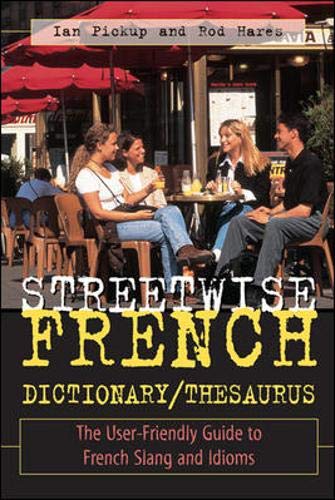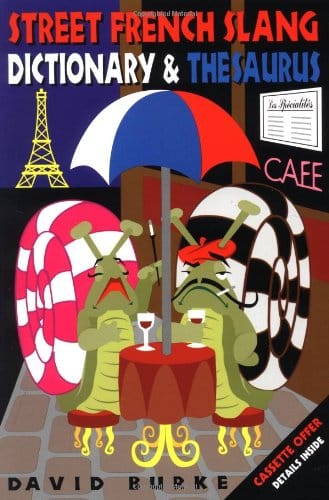Not Your French Prof’s Dictionary: 8 French Slang Dictionaries to Talk Like a Native

Today, we’re keeping it casual.
We’re not going to get uptight. We’re not going to get bent out of shape. We’re just going to simmer down, hang loose and chill out.
We might even chillax—you never know.
Want the skinny? Need the scoop? Would ya dig some more info?
Well, let me give you the 411.
Today, we’re going to be talking about those treasure-troves of idiomatic expressions—French slang dictionaries.
So take five, take a load off and let’s get this party started!
Zyva—chauffe, Marcel! (Go on—get ready to rock!)
Download: This blog post is available as a convenient and portable PDF that you can take anywhere. Click here to get a copy. (Download)
Why Learn French Slang?
You’re working hard to learn standard French. Learning slang requires a little extra effort, but it’s worth it. Why?
- Enjoy French with extra flavor. Slang can offer a more nuanced and colorful understanding of French. The language will start to feel more familiar and accessible, because you’ll be using casual expressions that native speakers use every day.
- Keep more current with the living language. Be better equipped to have casual conversations with today’s native speakers in many different social situations. While some slang hangs around for decades, slang is at the “cutting edge” of the language as it evolves.
- Better understand French media. Pick up on expressions that are commonly used in French movies, TV, music, blogs and social media. The more slang you understand, the more French media you’ll likely consume… which, over time, will help you increase your French fluency by leaps and bounds.
How Good Are You at Slingin’ Slang?
Before you get your slang dictionaries in hand and really start digging into them, here are a few ways you can test what you already know and practice the new slang you’re learning.
Online Slang Quizzes
There are many online quizzes you can take to test your knowledge of French slang. Here are a few to get you started:
- “How well do you know French slang?” In this 10-question multiple-choice quiz, find out where your French slang knowledge rates on a scale of “Yikes” to “Wow! Are you sure you’re not a native French speaker?”
- “How good is your French slang?” Each of these 15 questions comes with three possible answers. Discover the coolest ways to talk about people and partying.
- Quizlet’s French slang quiz: A combination of true/false, multiple choice and fill-in-the-blank questions to test your knowledge of these streetwise expressions.
You can then try this 15-question quiz in three formats, also from Quizlet, focusing on phrases for self-expression such as “it’s disgusting,” “it’s boring” and “I don’t care.”
- Fun Trivia’s French slang quiz: What do a cow and a rabbit have to do with French slang? Find out when you decode the questions in this multiple-choice puzzler.
Types of Slang Your Dictionary Should Cover
Slang seems to come out of the woodwork, sneaking its way into French in several different ways. Here are a few.
- Short and sweet. Standard French words are often abbreviated in speech and used as slang.
For example, a hungry ado (adolescent — teen) might go to a resto (restaurant — restaurant) to fill up.
And you may’ve read about the Count of Monte Cristo: he was a sailor who became an aristo (aristocrate — aristocrat).
- Inside-out French. Born in counterculture and favored by the younger generation, verlan is a special type of French slang created by reversing the order of the syllables in French words.
- Er, uh, oh, um… fill ‘er up! Languages around the world have filler words, utterances that mean little or nothing by themselves, but give the speaker a few seconds to think.
French is no exception. Casual conversations are full of words like quoi (what), ben (from bien — well) and euh (um).
- Something borrowed. France has its share of loan words from other languages. For instance, if you need something to keep you occupied ce week-end (this weekend), you might bouquiner—that is, go to la bouquinerie (used book store) to buy some bouquins (books). Then you can bouquiner vos bouquins (read your books). Bouquin and its related terms come from the Dutch boeckin, little book. The word came in through Middle French as boucquain (rare old book).
Numerous loan words in French come from English, such as stopper (to stop), le parking (the parking lot) and le shampoing (shampoo).
Many of these adapted foreign terms find their home in slang dictionaries, away from the watchful eye of l’Académie française (the French Academy, which guards over the integrity of the French language).
A Sampler of Basic French Slang Terms
How can slang make your French vocabulary more colorful? Test-drive a few of these common expressions and then read on for a list of slang dictionaries that’ll cure your cravings for colloquialisms.
Everyday People
Eh, les gars! (Hey, guys!) Listen up: slang can come in handy to describe your fellow humans.
Gather around, mes potes (my buddies) and I’ll tell you a little story about my acquaintances.
There’s this mec (man) I know, a real asperge (tall, thin person — literally, “asparagus”). He really loved his meuf (woman, girlfriend). The two got married and had a gosse (kid).
Expressing Yourself
Use extra pizazz to share your emotions and feelings.
If you’re full of vigor and energy, vous avez la pêche (literally, “you have the peach”). However, if things aren’t going your way, vous devez garder la pêche (you must keep your chin up).
If you’re exhausted, you might tell your friends, “Je suis crevé(e),” which means that the air (energy) has gone out of you, like a flat tire that’s burst.
If you feel really out of sorts or you’re confused by what’s going on, you can say, “Je marche à côté de mes pompes.” (This literally means, “I’m walking next to my shoes,” and implies that you’re out to lunch.)
Money, Honey
Don’t freak out if someone asks you for fric in France. They don’t want to know if you’re harboring a deviant in some dark corner of your basement. They just want some of your dough… greenbacks… bread… cash.
And if someone says, “Avez-vous de la thune?” they don’t want you to sing them a song. Again, they’re asking you if you have money.
So how does one faire bouillir la marmite (bring home the bacon — literally, “make the cooking pot boil”)? With un boulot or un taf—both slang ways of referring to a job. Don’t confuse un taf (job) with une taffe, which is a puff on a cigarette.
Eating and Drinking
While France has a reputation for gastronomic greatness, there are still times when its citoyens (citizens) want to pig out. And it was for this that bouffer was born. Bouffer comes from a sewing term meaning “to puff out.” It gave birth to la bouffe, which is a feast fit for a gourmand.
On s’appelle—on se fait une bouffe is the French way of saying, “Call me—we’ll do lunch.” (Or any other meal where there’s lots of food and merriment.)
Of course, with all that food at la bouffe, you’ll need something to wash it down. That’s when you can trinquer (to toast/to drink) with your friends.
Words for Every Occasion
These are slang phrases and common expressions that you won’t learn in French class, but you’ll hear in everyday French conversation.
Métro, boulot, dodo: The same old grind of commuting, working and sleeping—then starting all over the next day. (Dodo is a little kids’ word for “sleep.”)
Comme d’hab’: A way of saying “same old, same old” when someone asks, “What’s new?” It’s short for comme d’habitude.
Quand même: This little phrase is a workhorse. It can mean “wow” (expressing surprise), “anyway” (as in, “thanks anyway”) or “all the same/even so,” as in, Quand même, j’aimerais aller. (Even so/that being the case, I would still like to go.) It can even show your incredulity about someone’s plans.
I learned about quand même while spending l’année scolaire (the school year) in France. It became indispensable to me. When I returned home, I asked my bemused French professors why they hadn’t introduced this infinitely useful expression in class!
8 French Slang Dictionaries to Learn Everyday Lingo
We’ll start off with handy online French slang dictionaries, then a range of options available in print or as e-books.
Online French Slang Dictionaries
Maybe you don’t like lugging books around, or you just want to get your feet wet before you invest in a full-sized dictionary.
These online options may be a perfect fit for you.
1. French-Slang.net
Each short entry in this French slang blog presents the slang in context, with a brief explanation of its origin and meaning. At the end of every post is an audio file, with all of the examples pronounced.
The handy search box in the upper right-hand corner helps you hunt down particular words and phrases.
2. Language Realm
If you’re looking for an extensive online French slang dictionary with a formal layout, look no further. Language Realm lays out its storehouse of colloquial words and expressions in alphabetical order.
Many entries include both the figurative meaning and the literal translation, so you can get a sense of how some of these idioms were coined. Vulgar and pejorative terms are flagged so you can gauge when it’s appropriate to use them.
3. French Learner
The slang page on the French Learner site, run by French teacher David Issokson, lists slang words and phrases in handy categories. Each word or phrase has a link to an audio file, which you can hear online or download.
French Slang Books
If you’d prefer an entire book devoted to slang, here are several good options.
4. “What They Didn’t Teach You in French Class”
This book is a little edgy, but it’s certainly down to earth. French phrases follow the English ones, with notes on how to use some of the expressions in context.
The slang is divided up by topic. Explanations of particularly French customs, such as la bise (the “Hello kiss”), enrich your learning experience.
5. “Must-know French Slang Words and Phrases” (Audiobook)
Targeted at beginners, this audiobook introduces four slang terms per lesson, with 25 lessons total. It’s accompanied by tons of bonus learning material, like an e-book to read along with and special review tracks for vocabulary reinforcement.
Since this book comes from the team behind FrenchPod101, you know you’re getting material that’s both high quality and interesting. FrenchPod101 crafts lessons with French language experts, with a focus on entertaining and up-to-date learning material. To take your studies up a level, check out the FrenchPod101 podcast with more than 1,300 video and audio lessons (and more added all the time!).
Like the slang dictionary, the podcast comes with extra content like PDF lessons notes and “spaced repetition” flashcards that have you review words at the optimal moment for memorization. Check out all the FrenchPod101 features here.
6. “French Slang: Do You Speak the Real French?”
Frédéric Bibard of Talk in French asks, “Do you speak the real French?” Of course, he’s referring to French slang. If you aren’t yet fluent in “real French,” this text can help.
Slang words and phrases are presented in tables, with the French in the first column and the English equivalent to the right.
Purchasing the book also gives you access to audio files so you can hear exactly how these phrases are supposed to sound. Or you can choose the audiobook version, if the paperback or e-book (Kindle) format aren’t your cup of tea.
7. “Streetwise French Dictionary/Thesaurus: The User-friendly Guide to French Slang and Idioms”
This paperback contains not only an alphabetized dictionary of slang terms but also a topic-specific thesaurus that details words’ origins and usages.
Little comic drawings illustrate the French body language that accompanies many slang expressions. There are also exercises (complete with answer keys) to test your retention of the terms.
8. “Street French Slang Dictionary and Thesaurus”
Featuring French slang in both dictionary and thesaurus formats, “Street French Slang” is a thorough foundation for casual and familiar language.
True to the thesaurus aspect, the book offers synonyms and antonyms for many of the terms. The book identifies the relative “strength” (potential for offensiveness) of many slang words and phrases. Numerous examples provide content for the slang.
Particularly offensive terms are relegated to the final section of the book, “The Street French Thesaurus.”
FluentU takes authentic videos—like music videos, movie trailers, news and inspiring talks—and turns them into personalized language learning lessons.
You can try FluentU for free for 2 weeks. Check out the website or download the iOS app or Android app.
P.S. Click here to take advantage of our current sale! (Expires at the end of this month.)
With a French slang dictionary in hand, you’ll be learning more colorful French à pas de loup (in great strides)… and expressing yourself à toutes les sauces nouvelles (in all sorts of new ways).
Download: This blog post is available as a convenient and portable PDF that you can take anywhere. Click here to get a copy. (Download)
And One More Thing...
If you like learning French at your own pace and from the comfort of your device, I have to tell you about FluentU.
FluentU makes it easier (and way more fun) to learn French by making real content like movies and series accessible to learners. You can check out FluentU's curated video library, or bring our learning tools directly to Netflix or YouTube with the FluentU Chrome extension.
One of the features I find most helpful is the interactive captions—you can tap on any word to see its meaning, an image, pronunciation, and other examples from different contexts. It’s a great way to pick up French vocab without having to pause and look things up separately.
FluentU also helps reinforce what you’ve learned with personalized quizzes. You can swipe through extra examples and complete engaging exercises that adapt to your progress. You'll get extra practice with the words you find more challenging and even be reminded you when it’s time to review!
You can use FluentU on your computer, tablet, or phone with our app for Apple or Android devices. Click here to take advantage of our current sale! (Expires at the end of this month.)
















